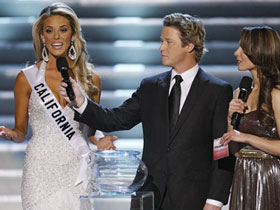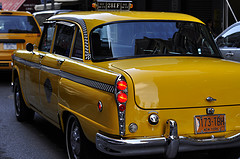 Every day, it seems there’s another Carrie Prejean story in the news. For those who haven’t been paying attention (and I kinda wish I was one of you), she’s the Miss USA pageant contestant from California whose answer to a question about her opinion on gay marriage (she opposes it on religious grounds) may have cost her the title. Amid much hoopla and debate, her name has been bandied about in the media and all over the Internet. She’s been the subject of both scorn and worship, depending on which side of the aisle you favor, even becoming a ‘defender of marriage’ for the National Organization for Marriage (NOM), a conservative organization. Honestly, I thought her 15 minutes were over.
Every day, it seems there’s another Carrie Prejean story in the news. For those who haven’t been paying attention (and I kinda wish I was one of you), she’s the Miss USA pageant contestant from California whose answer to a question about her opinion on gay marriage (she opposes it on religious grounds) may have cost her the title. Amid much hoopla and debate, her name has been bandied about in the media and all over the Internet. She’s been the subject of both scorn and worship, depending on which side of the aisle you favor, even becoming a ‘defender of marriage’ for the National Organization for Marriage (NOM), a conservative organization. Honestly, I thought her 15 minutes were over.
Then it came out that she not only has breast implants, but that the pageant paid for them. That really blew my mind. (Wasn’t there a time when they wouldn’t even let you compete in a beauty pageant if you so much as dyed your hair?)
Then, a day later, topless photos of her surfaced on the internet.
Strangely enough, I am not a Carrie Prejean hater. Though I disagree vehemently with her views on gay marriage (full disclosure: flaming liberal here) I think she’s as entitled to her opinion as I am to mine. (Sort of.) Besides, she was asked the question–by Perez Hilton no less.
I guess what’s bugging me about this ongoing story is not Miss Prejean’s arguable hypocrisy in promoting a ‘clean, Christian’ lifestyle if she’s been secretly snapping racy pictures or getting her breasts enhanced. It’s more the moral ambiguity of pageants proffering young women up as ‘role models’ for others, provided they first meet certain societal standards. This begs the question: Why are we publicly judging women at all? Especially, primarily, on their appearance? Why do we, as a society, enjoy putting young women in the spotlight and then delight in tearing them down?
For me, the concept of beauty pageants just seems so awful and sad–women parading themselves before a panel of judges (and all of America, really) in scanty attire after starving themselves away to such an extent that the natural womanly curves they did once possess ‘need’ to be ‘enhanced’ by artificial means (duct tape, ‘cutlets’ and Wonderbras are just some of the less extreme measures taken by contestants). Their faces, caught in the rictus of a smile, all lipstick and Vaseline, just seem to be screaming “Love me, PLEASE! I have no innate sense of self-worth! I need a crown and a title to tell me I’m acceptable.”
When I look at Miss Prejean and others on the pageant circuit, I see young women whose values seem troublesomely based on a need for others’ approbation. If it means fitting in with their church, they are perfect parrots of that church’s values–on Sundays and pageant days, at least. If society calls for them to be absurdly skinny and to have disproportionately large breasts, they will allow–no, beg for–their bodies to be cut open and ‘enhanced’. And if they think it will bring them love, money or attention, they’ll pose topless on camera. This makes me sad, but part of me gets it. Societal pressure bears down hard on women, and who doesn’t want to be admired?
What makes me mad is that the co-director of the pageant, Keith Lewis, not only allowed plastic surgery among the contestants, but even encouraged it–and worse, paid for it, telling CBS’s The Early Show, “We want to put her in the best possible confidence in order to present herself in the best possible light on a national stage.” This, to me, is the opposite of confidence, and seems hugely unethical. It turns tacit approval of plastic surgery into almost a demand that cosmetic procedures be done before a woman can feel confident to take her place upon the stage. This action by the pageant’s management turns my stomach. Women with already-fragile egos now see expectations of beauty and desirability raised to such an extent that the only way to compete is to risk death and disfigurement. This is the message beauty pageants want to pass along? These are the ‘role models’ they want to hold up to us? No thanks!
My only consolation is that the ratings for such pageants have been waning steadily for years now, and barely any networks even carry them anymore. Hopefully, they’ll continue to be phased out of mainstream culture.

